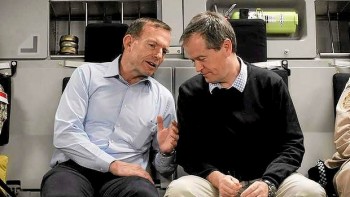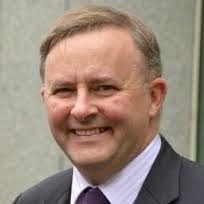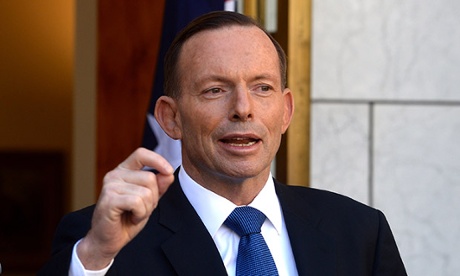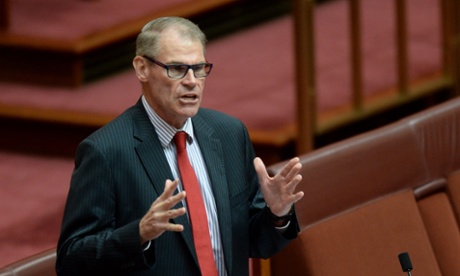Tony Abbott and Bill shorten are both indulging in failure

The Abbott Government’s serial
abuses of human rights, social justice, and our democratic processes
have become the norm, and their destructive task is made all the easier
with a tepid Opposition under an ineffectual Bill Shorten. Will this
current state of our politics ever change? John Faulkner’s attack upon the current state of the ALP holds the key, writes Paul G. Dellit.
Those who think about such things within the LNP will tell you that
self-interest, the predominance of the individual over society (patron
saint Thatcher denied the very existence of ‘society’), is the core
tenet of large ‘L’ Liberal philosophy. The extent to which the LNP is
able to egregiously pursue that philosophy, so that it becomes the ‘dog
eat dog’ interests of powerful individuals at the expense of the rest of
society, is simply a matter of what the political market will bear.
Successive Menzies’ Governments introduced a number of social and
welfare reforms and initiatives, and famously stole many of them from
the ALP platform to win elections – because Menzies felt he had to.
How much of the ALP platform was it necessary for Abbott to steal to
win the last election? Of course, the question is rhetorical. We know
that Abbott promised nothing new. He promised to axe ALP reforms which
he considered electorally unpopular (the carbon and mining taxes), and
not to change in any way those which had broad electoral appeal.
Once in office, he wielded the axe to everything that might impede
the interests of his clique of economic solipsists in the comfortable
knowledge that the promises he made before the election could be broken
immediately after the election. No believable excuses that new dire
circumstances had emerged would be needed: he knew that the ALP leader
would still be Bill Shorten.
In fact, Shorten’s tenure is proving so ineffectual that Abbott
doesn’t have to govern in the customary ‘here is my vision for the
future and the policies I have created to achieve it’ sense. He can
settle into the role which is his natural metier – opposition. Our Prime
Minister is never happier when he has something to be against:
- the young who are unemployed or seeking an education;
- the elderly who are pensioners or self-funded, or superannuated retirees;
- the sick;
- taxpayers who pay their scheduled rates of tax to make up the
shortfall left by members of his Club of the Main Chancers who offshore
their incomes to pay a tax rate of 0% to 10%; - genuine asylum seekers, including children, whom he incarcerates and
subjects to psychological torture (mostly Muslims – I wonder how he
would treat them if they were blond, blue-eyed Scandinavians); - resident Muslims peacefully wearing their customary forms of dress which he finds confronting; and
- his crowning glory, the advent of ISIL, which allows him to become a
‘PM at War’, just like his hero, John Howard – now there are people he
can be so against he can wish them killed. Of course, he can’t send
Australians to Africa to help save people because they couldn’t be
evacuated to Australia if they got sick – evacuation to Europe has not
even been considered.
The current LNP government can also afford to indulge itself in
failure. In alphabetical order, Abbott, Abetz, Andrews, Brandis,
Cormann, and the star of the show, Hockey, have all produced policies
and a Budget which have had to be significantly changed or abandoned
before they made it to implementation and, in some instances, even
before they made it to Parliament. In contrast, the Gillard minority
government was able to produce a number of landmark policies and get
them through both houses of Parliament. These, of course, are those
landmark initiatives and reforms that the Abbott Government is in the
process of dismantling.
It seems we are experiencing at first hand the truth of Edmund Burke’s saying,
“All tyranny needs to gain a foothold is for people of good conscience
to remain silent”. There was once a time when the ‘people of good
conscience’ in Opposition were the ALP. The ALP was once a party of
principle – to the admittedly impractical extent that some in the ALP
preferred Opposition to Government because of the corrupting influences
of power. Nevertheless, the ALP was once a party which had a set of
well-defined principles, and would stand by them, and if the electorate
found any of them unpalatable, the ALP would argue its case and attempt
to win it over – the ALP’s mission was to lead public opinion, not
follow it if it thought it was misinformed.
Now we have an ALP led by a man whose main claims to fame are that he
engineered the sacking of two sitting Prime Ministers. And it was
reported by Michelle Grattan that he was contemporaneously telling any
in the Parliamentary Press Gallery who would listen that he would be the
next leader of the ALP.
Well, he did become the next leader of the ALP, and what has he done
with it? Did he aspire to the job because he had the outstanding talents
needed to lift the ALP out of the parlous state it was in after its
orgy of self-destruction? Unless he has some master plan and is keeping
his powder dry for the present, it seems that he is simply an
ineffectual dud whose overweening ego led him to find his level of
incompetence.
Leave aside his diffident, inarticulate one-liners, his mangled metaphors, his preschool pronunciation of some words, and the Micallef
parodies – these are failures of leadership style and presentation. The
real issue for Shorten is that he is a man who seems to stand for
nothing beyond what the latest polls indicate he should stand for. In
short, he is the product of a corrupt ALP faction ridden system of
candidate selection. Once was a time when the factions were based more
upon their adherence to particular philosophies. Now, it seems the
factions are nothing more than groupings of power-addicted individuals
every bit as morally corrupt as the LNP.
Unless the ALP becomes the openly democratic organisation that John Faulkner argues for, the ALP will continue to have leaders of the calibre of Bill Shorten, and Prime Ministers of the stripe of Tony Abbott.
Labor veteran John Faulkner says his party must restore
its tradition of grassroots participation, eliminate the “stench of
corruption”, and work to end the fundraising arms race as part of a
broad effort to restore trust between major party politics and
increasingly alienated voters.
He also says the campaign “arms race” is skewing priorities and
perceptions in major party politics. “Elections must be a contest of
ideas, not a battle of bank balances,” he says.
“And in that contest of ideas, our political parties are paramount.
In our two party system the selection of candidates and the setting of
policies within the major political parties have perhaps as great an
influence on Australia’s governance as do general elections,” he says.
“It is therefore essential that Australia’s political parties are
open, transparent and democratic – no code words, no cabals, no secret
handshakes.”
It’s hard to argue with that.





